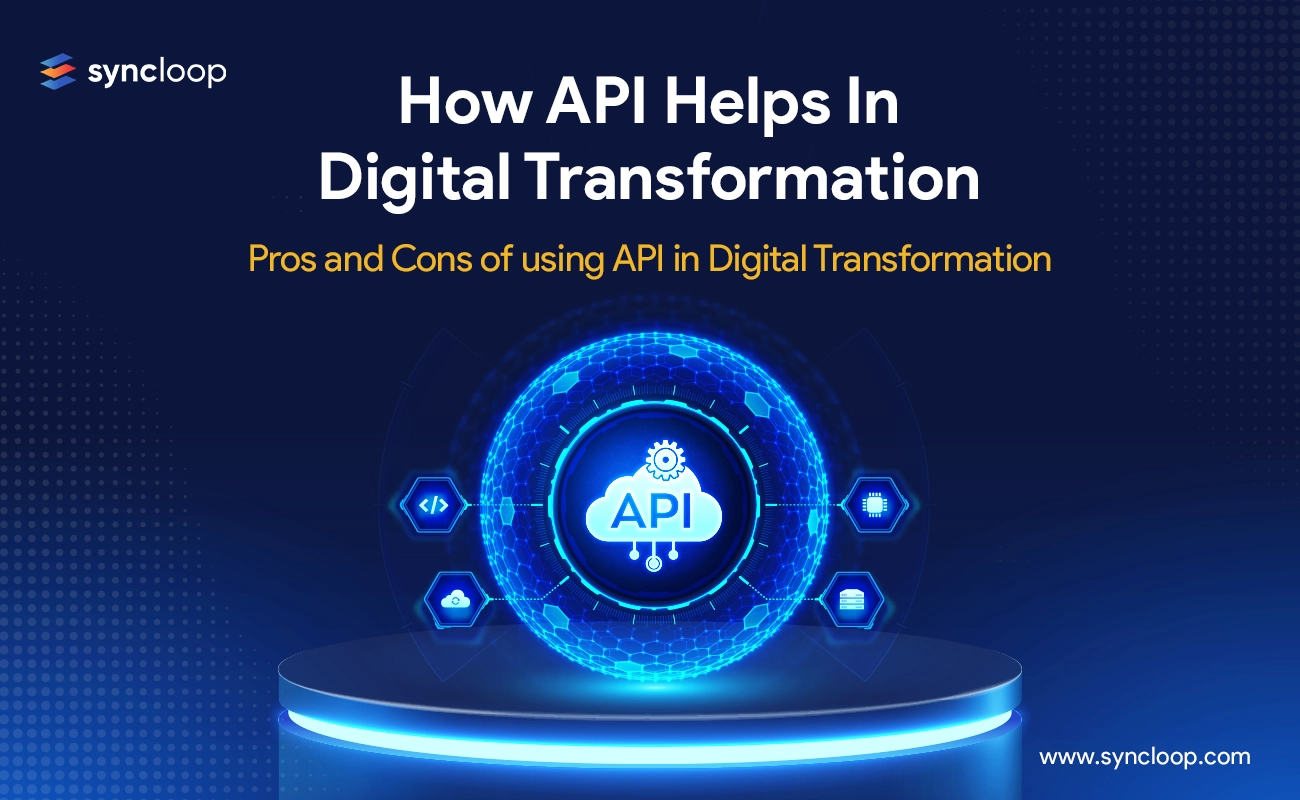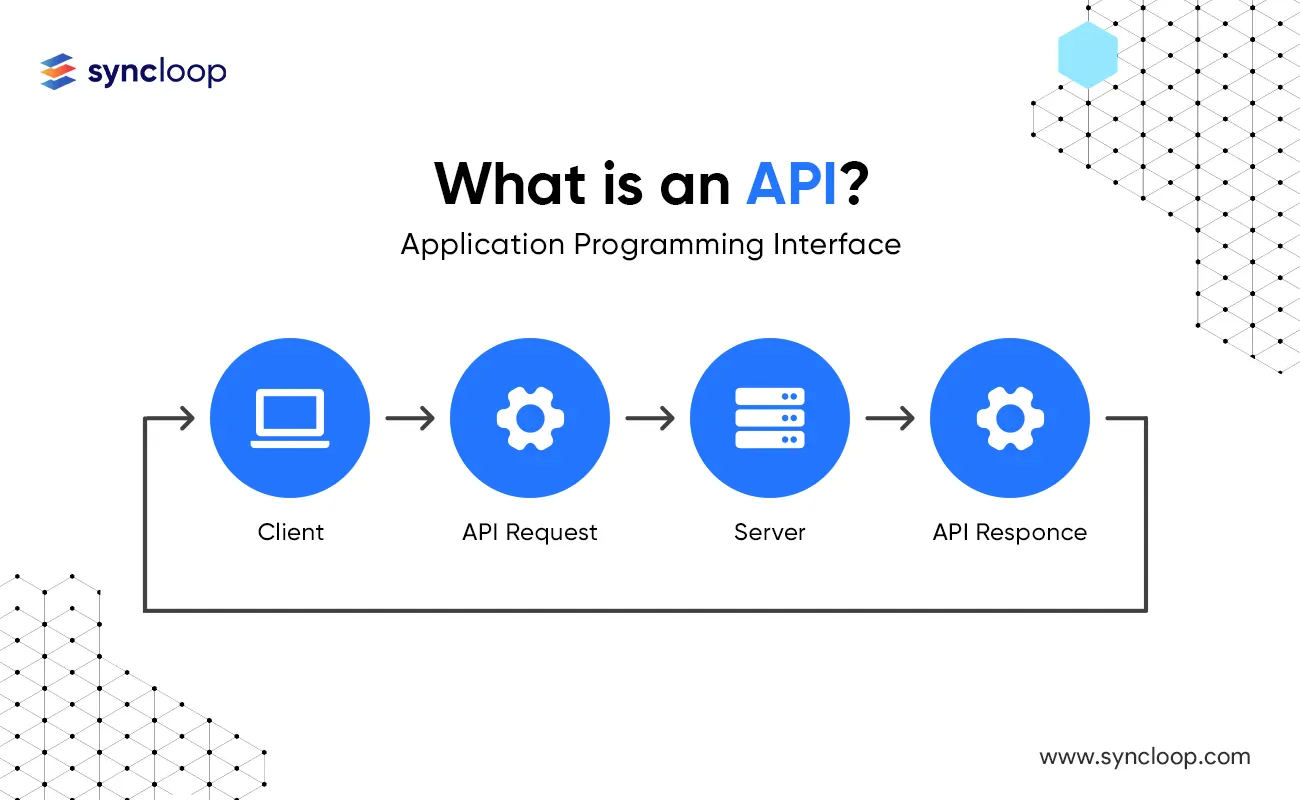How API Helps In Digital Transformation
Posted by: Rupesh | May 10, 2024

Categories: Digital Transformation, Cost Savings, User Experience
In today’s increasingly digital world, businesses are pressured to keep up with the latest technology to remain competitive. Digital transformation has become an essential part of any successful business strategy. One of the most important aspects of digital transformation is using Application Programming Interfaces (APIs). APIs are a powerful tool that enables companies to easily connect their existing systems, applications, and services, creating a seamless user experience. At the core of digital transformation lies the Application Programming Interface (API), which has become a crucial component of modern technology solutions. In this blog post, we'll discuss the role of API in digital transformation and its benefits, risks, and how to get started. First, let's define API and digital transformation.
APIs play a critical role in digital transformation as they enable organizations to leverage existing data and systems to create new applications, processes, and services that drive innovation and growth. By exposing functionality through APIs, organizations can provide customers and partners with access to their systems, data, and services, leading to improved collaboration, faster innovation, and better outcomes. As such, APIs have become the building blocks of digital transformation, providing organizations with the tools to create new products and services, improve customer experiences, and gain competitive advantage.
How APIs Help With Digital Transformation
Digital transformation is not just about adopting new technology, but it's also about utilizing the technology in a way that allows organizations to streamline their processes, create a more efficient working environment, and ultimately drive better business outcomes. Application Programming Interfaces (APIs) have become essential tools for organizations that want to succeed in today's digital age. Here's how APIs help with Digital Transformation:
- Cost Savings: APIs provide developers with pre-built functionalities, tools, and other essential components, which help them build applications faster and more efficiently. The use of APIs helps save development costs, resources, and time, making it a valuable tool for organizations seeking digital transformation.
- Establish Security and Governance: One of the biggest challenges that come with digital transformation is security and governance. With the help of APIs, developers can create applications with unified security and governance, which ensures that the applications meet the organization's compliance and regulatory standards. This creates a secure and protected environment, which is essential for digital transformation.
- Enhance the Visibility and Transparency of Enterprise Solutions: APIs play a vital role in providing better visibility and transparency for organizations seeking digital transformation. With the use of APIs, businesses can access tools and applications that allow for a clear and detailed understanding of the enterprise solution's current status. This transparency helps organizations identify areas for improvement and increases accountability.
- Ecosystem-Driven Economy: API gateways are a fundamental part of digital transformation. They enable organizations to access and connect with a range of services, applications, and data, ultimately creating an ecosystem-driven economy. API gateways also enable businesses to adapt quickly to market changes and to develop new business models, services, and products that align with changing customer demands.
- Connected Customer Experience: In today's digital age, customers demand connected experiences. APIs help businesses connect different channels, like web apps, mobile applications, and social media platforms, providing a seamless experience across all channels. The use of APIs can help organizations build innovative and engaging customer experiences, leading to higher customer satisfaction, retention, and loyalty.
Benefits of Using APIs
APIs or Application Programming Interfaces have been widely adopted by organizations of all sizes to accelerate their digital transformation efforts. The benefits of using APIs go far beyond simple data exchange. In this section, we will delve deeper into some of the key benefits that APIs provide.
- Faster Development: Developing an API reduces the development time required for an application. By creating a single codebase for multiple applications, developers can save time and resources on building separate interfaces for different systems.
- Easier Integration: APIs provide a lot of sources like documentation, code examples, etc., making it easy for developers to integrate them with other systems. Additionally, many APIs come with pre-built integrations that can be easily installed, further streamlining the integration process.
- User Experience: By separating the UI from the backend systems, APIs allow developers to focus more on the UI/UX part of the application, resulting in an improved user experience. APIs also help in building modular applications, which means developers can make changes to the user interface without affecting the backend systems.
- Greater Flexibility: APIs are incredibly flexible and can be adapted to changing business requirements without disrupting existing systems. This flexibility enables organizations to build scalable and customizable applications that can evolve with changing market trends.
- Competitive Advantage: Organizations that adopt APIs have a competitive advantage over those that don't. APIs help companies create new products and services faster, enter new markets quicker, and streamline processes, giving them a leg up on the competition.
- Supports Cloud Agnostic: APIs are designed to work with different cloud environments and can support multiple cloud providers. This enables businesses to choose the best cloud provider based on their specific needs, rather than being locked into one vendor.
- Auto Scale Approach: APIs enable the auto-scaling of resources, which means that they can handle a large volume of traffic without any issues. This ensures that the application remains available even during peak periods, providing a seamless user experience.
How API Will Help Different Sector In 2024?
APIs are becoming an integral part of every sector in the digital world. The rise of API usage is helping different sectors to work with different applications and provide services to users. In this section, we will discuss how APIs will help different sectors in 2024.
API First
In recent years, the trend toward API-first design has gained popularity, especially with the increasing demand for faster digital transformation. This approach requires developers to create an API before developing the user interface, which allows for better integration between different systems and applications. As per GGV Capital Index, API-first companies received more than a billion dollars from VCs giving an indication that more startups are API-first companies.
The future of API-first design looks promising, especially as more organizations adopt the cloud. The move to cloud-based infrastructure increases the demand for APIs, which means that API-first design is here to stay. As the demand for APIs grows, there will be more emphasis on creating high-quality APIs that can be easily integrated with other applications. API-first design can help organizations achieve this goal by creating APIs that are scalable, interoperable, and easy to use.
Plugins and 3rd party API Integrations
APIs can be integrated with third-party applications and plugins, allowing for increased reusability of code and greater flexibility in application development. Integrating 3rd party APIs into your digital transformation plan can help you achieve a wider range of features, services, and integrations while also allowing for faster and more efficient development. Reusability will be the key for developers in the future. By providing plugins and third-party API integrations, developers can save a lot of time in development. Also, this creates a better customer experience by adding more features, widgets, or plugins that improve customer satisfaction.
Risks Associated With Using APIs
As beneficial as APIs are for digital transformation, there are some risks that come with using them. These risks include data breaches, quality assurance issues, poorly designed APIs, and technical debt.
- Data Breaches: One of the biggest risks associated with using APIs is the potential for data breaches. APIs are a prime target for cybercriminals looking to gain access to sensitive information. It is important to ensure that API security measures are in place to protect against potential breaches.
- Quality Assurance Issues: Another risk associated with using APIs is quality assurance issues. When an API is not thoroughly tested, it can lead to problems such as slow response times, incorrect data, or even crashes. To avoid these issues, it is crucial to have a thorough testing process in place.
- Poorly Designed APIs: Poorly designed APIs can also pose a risk to businesses. If an API is not well-designed, it can be difficult to integrate with existing systems and can cause delays and errors. It is essential to carefully select APIs that are well-designed and can integrate seamlessly with existing systems.
- Technical Debt: Finally, technical debt is a risk associated with using APIs. This refers to the accumulation of design decisions, coding practices, and other factors that can lead to a backlog of technical issues. Technical debt can lead to significant costs in terms of time and resources, making it important to monitor and manage technical debt in API usage.
- Not adopting GraphQL’s latest capabilities: Not adopting GraphQL’s latest capabilities can also be a risk associated with using APIs. GraphQL is a query language for APIs that has gained popularity in recent years. However, not all organizations have adopted its latest capabilities, which can result in outdated APIs that do not perform as well as they could.
- Non-Standard Approach: Non-standard approach to writing business logic can lead to significant risks. This can result in issues such as inconsistent results, poor performance, and an inability to properly scale the application or service. Therefore, it is important to ensure that the business logic is properly defined and standardized to ensure optimal performance and scalability.
In summary, while APIs offer numerous benefits for digital transformation, there are risks that need to be considered. To minimize these risks, it is important to carefully select well-designed APIs, thoroughly test them, and monitor technical debt.
Bottomline
APIs have become a crucial aspect of digital transformation. They allow for seamless integration of systems and applications, making it easier to develop innovative solutions for business challenges. The benefits of using APIs include faster time-to-market, enhanced customer experience, increased revenue, and improved data accuracy.
As we look to the future, it's clear that APIs will play an even greater role in different sectors. According to Gartner, by 2024, more than 75% of global organizations will have APIs as a core strategic asset for digital business strategies.
While APIs bring numerous benefits, they also come with risks. Businesses must be aware of potential security vulnerabilities, such as those related to cars, and take steps to mitigate them. This involves implementing robust security protocols and ensuring regular updates to avoid data breaches and cyber-attacks.
The future of digital transformation is intertwined with the use of APIs. Organizations that prioritize API adoption and API management will be better positioned to take advantage of emerging technologies, such as artificial intelligence, and gain a competitive advantage. Ultimately, API integration is a crucial component of modernizing digital operations and enabling organizations to thrive in a fast-paced and ever-changing digital landscape.
Overall, APIs will continue to be a vital component of digital transformation in the coming years. As businesses seek to remain competitive and relevant in a rapidly evolving digital landscape, the ability to integrate various systems and technologies will be a key differentiator. By leveraging APIs effectively and prioritizing security measures, businesses can position themselves for success and long-term growth.
Back to Blogs

